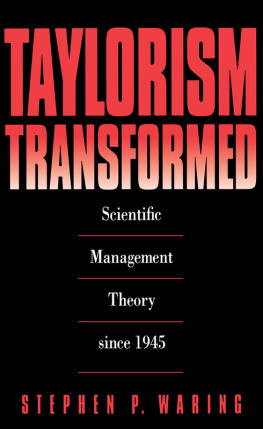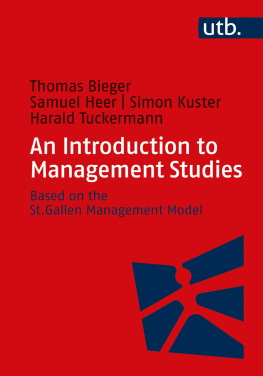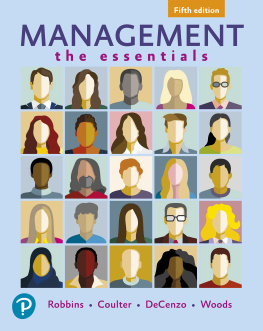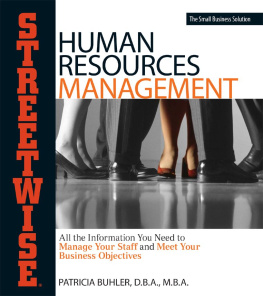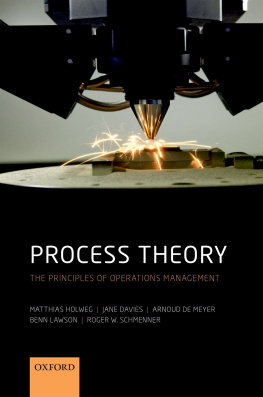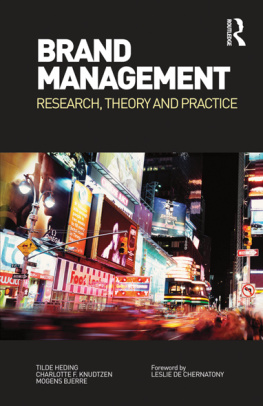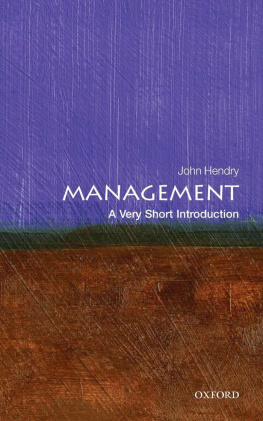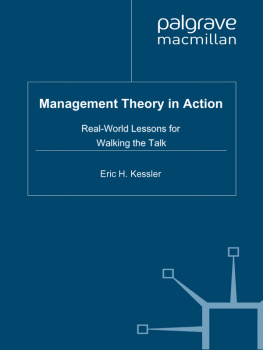
Taylorism Transformed
Stephen P. Waring
Taylorism Transformed
Scientific Management Theory since 1945
The University of North Carolina Press
Chapel Hill and London
1991 The University of North Carolina Press
All rights reserved
Manufactured in the United States of America
The paper in this book meets the guidelines for permanence and durability of the Committee on Production Guidelines for Book Longevity of the Council on Library Resources.
95 94 5 4 3 2
Library of Congress Cataloging-in-Publication Data
Waring, Stephen P.
Taylorism transformed : scientific management theory since 1945 / by Stephen P. Waring.
p. cm.
Includes bibliographical references and index.
ISBN 0-8078-1972-7 (cloth: alk. paper)
ISBN 0-8078-4469-1 (pbk.: alk. paper)
1. Industrial managementHistory. I. Title.
HD30.5.W37 1991
658.001dc20
91-11027
CIP
THIS BOOK WAS DIGITALLY MANUFACTURED.
To Mom and Pop
and to the memory of
my grandfathers
Contents
Introduction
Politics in Management History
Taylorism and Beyond
Bureaucracy and Its Discontents
Management by the Numbers
Operations Research and Management Science
Economics and Cybernetics
The Bureaucratic Rationality of Herbert A. Simon
Virtue as Managerial Vision
Peter F. Drucker and Management by Objectives
The Rationality of Feelings
Sensitivity Training and the Democratic Manager
Capitalism without Class?
Job Enrichment and the Baby Boomers
The American Samurai
Japanizing American Corporatism
Conclusion
The Management Theory of Value
Preface
If books grow from the lives of authors, then this book stemmed from my upbringing on the Nebraska prairie. From populist roots, it voices the suspicion of centralized power, concern for social responsibility, desire for individual autonomy, and hope for democracy that can still flourish in farms and country towns.
And like any book that grew from a dissertation, this one emerged from listening to teachers and reading other books. Although I am primarily interested in the social history of ideas, this book was especially influenced by institutional and new labor historians. Institutional scholars like Robert Wiebe and my advisor Ellis Hawley taught me to look for political issues in technical debates, to study professions as power centers, and to respect the diversity and complexity of contemporary America. And labor historians like David Montgomery and my teacher Shel Stromquist offered instruction in the struggles in the American workplace. For better and for worse, however, my scholarship has partly turned from the paths of my mentors and has moved in a different direction, tracing the ideas that guide economic institutions.
Indeed this book was shaped by the philosopher Alasdair MacIntyres After Virtue (Notre Dame, 1981). MacIntyre was especially convincing in refuting the scientific pretensions of managerial experts. He used game theory as his example, analyzing its very abstract concepts in a very abstract way and describing its technocratic premises as moral claims. I did not, however, accept all of MacIntyres arguments. His Aristotelian criticism of liberalism was entirely too liberal (liberal readers might be happier replacing liberal with conservative). It tended to presume the morality of existing social structures, and so his notion of virtue could be used to integrate people into corrupt practices. And MacIntyre wrongly disregarded the radical tradition originating in the Enlightenment, slighting particularly Rousseaus conception of virtue.
Even so, MacIntyre helped inspire me to plunge into research on recent management theory. Like him, my purpose was to describe management ideas as moral philosophy. But unlike MacIntyre, I proposed to put business management ideas in a social and historical context and to select ideas more influential than game theory. In addition, I intended to show that although the management theorists were usually not aware of it, they argued like philosophers.
This approach to management history is in some ways heretical. The Introduction explains its differences from business and labor historiography, particularly from the interpretation of Alfred Chandler.
Given these differences, I hope business and labor historians, as well as scholars in other disciplines, will tolerate an intellectual historian and old-fashioned humanist. But readers expecting a comprehensive study of recent management theory and practice will be disappointed. No effort was made to survey all of recent business history or even all management ideas; instead important, representative ideas were studied. In addition, my research into application of the ideas was indirect, drawing from theorists stories. And my stories about their stories seldom offer blow-by-blow accounts of applications but summarize theorists conclusions about what happened. This method, I decided, best kept fundamental political ideas front and center.
Of course a history of management ideas is subject to all the normal criticisms of intellectual history. Particularly it could be interpreted as being too ivory-tower and too ideological and as slighting the productive advances, technological developments, and organizational changes of recent corporate history. But studying the ideas of educators of elites can provide important insights into how elites chose their values, defined their problems, and developed strategies. Indeed in the last century, the business elite has not been restricted to managers; it has included academics in universities and experts in consulting firms who tried to direct the thinking of managers. And their writings and ideas offer fertile pickings for intellectual history.
All thinkers, even management thinkers, need a community, and this book began in a community of friends and colleagues in Iowa City. The University of Iowa awarded the Louis Pelzer Dissertation Fellowship, and the history department gave employment. Alan Spitzer exposed me to European corporatism. Alan Megill encouraged me to read MacIntyre. Mitch Ash helped with Kurt Lewin. Steve Vlatos made suggestions on Japanese management. Steve Pyne told me to find my voice. Dick Jankowski helped with bibliography. With good humor, Don McCloskey tolerated my politics and naive questions about economics. Shel Stromquist taught me more than he thought he did. And my mentor, Ellis Hawley, suggested the topic, saved me from error and sin, labored over my prose, abided my enthusiasms, laughed at my bad jokes, and treated me with respect even when I did not deserve it; he was my first professional colleague.
Many people, all of whom I would love to mention, sustained me with friendship; among them were Lee Anderson, Fred Bjornstad, Charlotte Fallon, Andy Federer, Marcelline Hutton, Russ Johnson, Elizabeth McCartney, Joe McMillan, Pat McNamara, Tim Mattimoe, Jeff Myers, Gary Olson, Janet Owens, Doug Parks, David Roethler, Doc Rossman, Rosanne Sizer, Tom Smith, Ken Staggs, and Mary Strottman. A few buddies will always be just like family; they include Ruth Wheeler, Brenda Child, Janusz Duzinkiewicz, Jeff and Rosemarie Ostler, the Tuckers, and Brin. And my family back in Bloomington and beyond know where my heart is.
New friends and colleagues at the University of Alabama in Huntsville read chapters and made important recommendations; they include Glenna Colclough, Andy Dunar, and Tom Wren. Dan Rochowiak helped with Herbert Simon and satisficing. Particularly I am indebted to Johanna Shields who offered kind words and sage advice on writing history.
Next page
